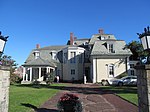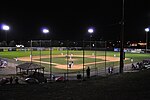Sexual Minorities Archives
All accuracy disputesLGBT culture in MassachusettsLGBT museums and archivesLGBT organizations in the United StatesMuseums in Hampden County, Massachusetts ... and 1 more
Organizations based in Holyoke, Massachusetts
The Sexual Minorities Archives is one of the longest continually operating archives of LGBT material in the United States, which holds the Leslie Feinberg Library, a collection of the late writer's personal research materials. The physical archive is located in a large converted Victorian home in Holyoke, Massachusetts, as of 2017. It was located in the home of curator Ben Power in Northampton, Massachusetts, from 1979 to 2017. It was founded in Chicago in 1974 by a lesbian-feminist organization known as the New Alexandria Lesbian Library.
Excerpt from the Wikipedia article Sexual Minorities Archives (License: CC BY-SA 3.0, Authors).Sexual Minorities Archives
Lincoln Street, Holyoke
Geographical coordinates (GPS) Address Nearby Places Show on map
Geographical coordinates (GPS)
| Latitude | Longitude |
|---|---|
| N 42.215785 ° | E -72.626394 ° |
Address
Lincoln Street 131
01040 Holyoke
Massachusetts, United States
Open on Google Maps










